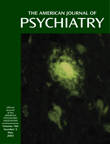The Intermediate-Term Outcome of Chinese Patients With Anorexia Nervosa in Hong Kong
Abstract
OBJECTIVE: The authors determined the intermediate-term outcome of anorexia nervosa for Chinese patients in Hong Kong. METHOD: A consecutive series of 88 patients who fulfilled DSM-III-R criteria for typical (i.e., fat phobic [N=63]) and atypical (i.e., no fat phobia [N=25]) anorexia nervosa were contacted at least 4 years after onset of their illness for semistructured and self-rated assessments of outcome. RESULTS: Three patients (3.4%) died; the mortality ratio for this group against the expected standard for subjects of similar age and gender was 10.5 to 1. Eighty (94.1%) of the remaining 85 patients were successfully traced 9.0 years after onset of their illness. Good, intermediate, and poor outcomes were seen in 61.8%, 32.9%, and 5.3% of the subjects, respectively. Anorexia nervosa, bulimia nervosa, or eating disorder not otherwise specified was exhibited by 55.0% of the subjects (N=44). Lifetime depressive (81.6%) and anxiety (27.6%) disorders were common. Older age at onset and the presence of fat phobia independently predicted poor outcome. Patients with atypical anorexia nervosa were symptomatically stable, less likely to demonstrate bulimia, and had a better eating disorder outcome than patients with typical anorexia nervosa. CONCLUSIONS: The outcome profile of Chinese patients supported the cross-cultural disease validity of anorexia nervosa. The cultural fear of fatness not only shaped the manifest content but also added to the chronicity of the illness.



